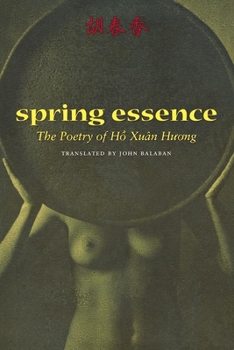Spring Essence: The Poetry of Ho Xuan Huong
Select Format
Select Condition 
Book Overview
This major cultural and historical event features ancient Vietnames script and translations by premier American poet.
Format:Paperback
Language:English
ISBN:1556591489
ISBN13:9781556591488
Release Date:October 2000
Publisher:Copper Canyon Press
Length:140 Pages
Weight:0.75 lbs.
Dimensions:0.6" x 6.0" x 9.0"
Customer Reviews
5 ratings
Spring Essences
Published by Thriftbooks.com User , 22 years ago
These poems by the 18th century Vietnamese poet Ho Xuan Huong (whose name means "Spring Essence") as translated into English by the poet John Balaban are truly delightful. The poems poke fun at self-satisfied government officials, intellectuals--men in general--with good-humored irreverence. "Young Scholars," picturing students who "can't even talk," suggests that "Someone. . . teach these fools/ to take their brushes and paint the pagoda walls." With the voice of a concubine who knows her clientele intimately, HXH writes of the "male member": "Newborn, it wasn't so vile. But now, at night,/ even blind it flares brigher than any lamp." Clearly, this poet is courageous, attacking convention at a time when few Vietnamese women even knew how to write. She does not reserve her wit for men alone, but accuses women of being weak-minded as well, as in this line from a poem offering "consolation" to a young widow: "If you've got weak blood, don't eat rich food." As any attentive reader can see in the versions of the poems printed in modern Vietnamese, HXH utilizes rhyming forms. Balaban's translations pay homage to the forms by attending to rhyme and sound without being bound by strict rhyme. The near-rhymes in this couplet from a poem on cats offers a good example of the sound-play Balaban engages in : "their only thought is to pounce on a mouse/ then croon from rooftops arousing meows." (The poem, in Huong's clever use of double-entendre, also suggests more than it says). Despite the sometimes rough subject matter, this is an elegant book. John Balaban and his publisher, Copper Canyon Press, deserve a lot of credit for bringing the poems of Ho Xuan Huong to a contemporary audience in three versions--the original ideographic Nom script, the modern, Romanized Vietnamese equivalent, and Balaban's lyrical English versions.
It Couldn't Be Better!!
Published by Thriftbooks.com User , 22 years ago
As a Vietnamese who has some background in the Vietnamese language and literature, I am amazed by poet John Balaban?s keen interest in my language and its poetry as well as his poetic skills through his well-known and well-loved translation of Ho Xuan Huong?s poetry entitled Spring Essence.Balaban skillfully brings to life the three-century old Vietnamese female poet to the Western world. More importantly, he also makes it alive and appreciated by the intellectual, contemporary readers. Needless to say, Balaban has done a remarkable job translating Ho Xuan Huong?s poetry. Her poetry structure, which is complicated by the Vietnamese art of NOI LAI (reversals) that she cleverly applies in her poems and her very own way in creating sexual themes full of double meanings. To do this, it takes a translator?s special talent and extraordinary effort to take on this major task. Poet John Balaban?s own art of translating Ho Xuan Huong?s poetry is to reveal ?a poem behind a poem? in such a delicate way so that his non-Vietnamese readers can explore and enjoy Ho Xuan Huong?s poetry further, which is what literary translation is all about.Since poetry language is metaphoric that requires a certain level of understanding of literature, it is unrealistic to expect all readers (Vietnamese or non-Vietnamese) to catch the soul of Ho Xuan Huong?s unsual poetic style. However, Balaban makes this possible.
A Marvel
Published by Thriftbooks.com User , 24 years ago
I picked this book up, read one poem and could not put it back on the shelf. The poetry within the pages comes from a sharp eye that recognizes the complexities of life in few words. There is timelessness here. -- And bravo for the details/research included...such background information is as fascinating as the poems.
Sensual and erotic Spring.
Published by Thriftbooks.com User , 25 years ago
"Over the years, a clever voice echoes," poet-translator John Balaban writes. "On the river, an old moon recalls Xuan Huong" (p. 135). Ho Xuan Huong (whose name means "Spring Essence") was an eighteenth-century Vietnamese poet and concubine. "Often just giving up, but always returning," Balaban spent ten years translating the forty-nine poems collected here (p. 14). Through her poetry, Xuan Huong is known for "her verbal play, her wicked humor, her native speech, her spiritual longing, her hunger for love, and her anger at corruption" (p. 5). She wrote her poems in "Nom," Vietnamese common language. These poems are sensual and erotic, and full of sexual double entendres (e.g., "Weaving at Night," "Swinging," The Paper Fan," and "The Wellspring").Balaban succeeds in interpreting Xuan Huong's imagery into English verse that resonates with spring essence. In "Autumn Landscape," Xuan Huong writes, "Drop by drop, rain slaps the banana leaves," and "My backpack, breathing moonlight, sags with poems" (p. 19). In "The Scarecrow," she writes, "I've never stepped out on the road to fame/ seeking reward only in a little dew and rain" (p. 99). In "Questions for the Moon," she asks, "Weary, past midnight, who are you searching for?/ Are you in love with these rivers and hills?" (p. 111). In "Spring-Watching Pavilion," she sees "heaven upside-down in sad puddles," and then observes "Nirvana?/ Nirvana is here nine times out of ten" (p. 115).This sensually-rich collection left me hoping for more. My only disappointment was learning that these hundred pages represent "most of Xuan Huong's extant poetry" (p. 14). This thin book shines brightly. G. Merritt
Books that are necessary
Published by Thriftbooks.com User , 25 years ago
There are some books necessary to particular libraries. There are some books necessary for particular readers. In an age of diverse languages and lingustic development this is a book necessary for all readers of poetry. Buy it. Read it. Admire it.





